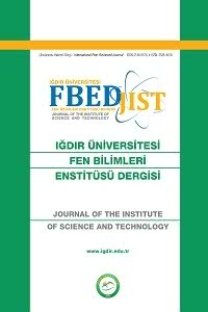Allelopathic Effects of Flower Extract of Oleander (Nerium oleander) on the Germination of Seed and Seedling Growth of Lolium multiflorum
Zakkum (Nerium oleander) Çiçek Ekstraktının Lolium multiflorum’un Tohum Çimlenmesi ve Fide Gelişimi Üzerine Allelopatik Etkileri
___
- Afridi R A, Khan M A, 2015. Comparative effect of water extract of Parthenium hysterophorus, Datura alba, Phragmites australis and Oryza sativa on weeds and wheat. Sains Malaysiana 44(5): 693-699.
- Alam S M, Ala S A, Azmi A R, Khan M A, Ansari R, 2001. Allelopathy and its Role in Agriculture. Journal of Biological Sciences, 5: 308-315.
- Algandaby M M, El-Darier S M, 2016. Management of the noxious weed; Medicago polymorpha L. via allelopathy of some medicinal plants from Taif region, Saudi Arabia. Saudi Journal of Biological Sciences http://dx.doi.org/10.1016/j. sjbs.2016.02.013.
- An M, Pratley J E, Haig T, 1998. Allelopathy: From Concept to Reality. “Agronomy, growing a greener future? (Eds) by D L Michalk and J E Pratley. Proceedings of the 9th Australian Agronomy Conference, Charles Sturt University, Wagga Wagga, N S W.
- Ashrafi Z Y, Sadeghi S, Mashhadi H R, Hasan M A, 2008. Allelopathic effect of sun flower (Helianthus annus) on germination and growth of wild barley. J. of Agric. Technol. 4, 219-229.
- Chon S U, Choi S K, Jung S D, Jang H G, 2002. Effects of alfalfa leaf extracts and phenolic allelochemical on early seedling growth and root morphology of alfalfa and barnyard grass. Crop Prot., 5: 1077-1082.
- Dakshini K M M, Foy C L, 1999. Allelopathy: One component in a multifaceted approach to ecology. In: Inderjit, C L, Foy, K M M, Dakshini (eds.): Principles and Practices in Plant Ecology, Allelochemical Interactions, CRC Press, 3-14.
- Iskenderoglu S N, 1995. Investigations on the bioherbicide effects of plant extracts and the rest on the growth of weed species. University of Cukurova. Institute of Science and Technology. Master Thesis. 121 pp.
- Karaaltin S, Idikut L, Uslu O S, Erol A, 2004. Effect of Root, Stem, Leaf and Bud Extracts of Oleander (Nerium oleander) on The Germination of Seed and Seedling Growth of Bean and Wheat. KSU Journal of Science and Engineering 7 (1) - 2004, 111-115.
- Khan M A, Afridi R A, Hashim S, Khattak A M, Ahmad Z, Wahid F, Chauhan B S, 2016. Integrated effect of allelochemicals and herbicides on weed suppression and soil microbial activity in wheat (Triticum aestivum L.) Crop Protec., 90: 34-39.
- Kumar A N, Divyashree N R, Kiran K, Pavithra G S, Rohini B, Sangeeta A, Sindhu S, 2011. Inhibitory Effects of Nerium oleander L. and Its Compounds, Rutin and Quercetin, on Parthenium hysterophorus L. Journal of Agricultural Science Vol. 3, No. 2.
- Macias F A, Galindo J, Molinillo J, 2004. Allelopathy: Chemistry and Mode of Action of Allelochemicals. CRC Press.
- Onen H, 2003. Bioherbicidal Effects of Some Plant Essential Oils. The Journal of Turkish Weed Science Volume 6/1, 39-47.
- Rice E L, 1974. Allelopathy. Academic Press Inc. Orlando F L. Steel R G D, and Torrie J H, 1980. Principles and procedures of statistics. A Biometrical Approach. 2nd edition. McGraw Hill Book Co. Inc. New York, USA.
- Terzi L, Kocacaliskan I, Benliglu O, Solak K, 2003. Effect of juglone on growth of cucumber seedlings with respect to physiological and anatomical parameters, Acta Physiol. Plant. 25, 353-356.
- TKIB, 1997. Sub-commission Report on Agricultural Structure and its Changes. In: Final Report of the 1st Agriculture Workshop, Ankara, 42-50.
- Uludag A, Uremis I, Arslan M, Gozcu D, 2005. Johnsongrass control using Brassicaceae crops. 4th MGPR Symposium. 21- 24, Turkey, 123.
- Uludag A, Uremis I, Arslan M, Gozcu D, 2006. Allelopathy studies in weed science in Turkey a review. Journal of Plant Diseases and Protection.
- Uygur N F, Iskenderoglu N S, 1997. Allelopathic and Bioherbicide Effects of Plant Extracts on Germination of Some Weed Species. Turkish Journal of Agriculture and Forestry, 21, 177- 180.
- Waller G R, 2004. Introduction-reality and future of allelopathy. In: F A, Macias, J C G, Galindo, H M G, Molinilla, H G, Cutler (eds.): Allelopathy: chemistry and mode of action of allelochemicals, 1-12.
- Weston L A, 2005. History and Current Trends in the Use of Allelopathy for Weed Management. Cornell University Turfgrass Times, 13: 529-534.
- ISSN: 2146-0574
- Yayın Aralığı: 4
- Başlangıç: 2011
- Yayıncı: -
Öklid-3 Uzayında Açılabilir Olmayan Regle Yüzeylerin Striksiyon Çizgileri
Hamid CEYLAN, Orhan ERDOĞAN, Atena GHOSIGHAREHAGHAJI
Hakkı AKDENİZ, İbrahim HOSAFLİOĞLU, Bilal KESKİN
Fatma Nur ELMA, Özdemir ALAOĞLU
Curvatures of Implicit Hypersurfaces in Euclidean 4-space
Ursodeoksikolik Asit’in İnsan Periferal Kan Lenfositlerindeki in Vitro Genotoksik Etkisi
Songül Budak DİLER, Fikriye POLAT, Eyüp ÖZER
Mustafa Abdullah YILMAZ, Oguz ÇAKIR, Enes ARICA, İsmail YENER, Birol OTLUDİL, Mehmet Hakkı ALMA, Abdulselam ERTAŞ
Osman GEDİK, Ali Rahmi KAYA, Ömer Süha USLU, Adem EROL, Muhammad Azim KHAN, Mustafa Nur TAŞSEVER, Etem TÜRKKAYA
